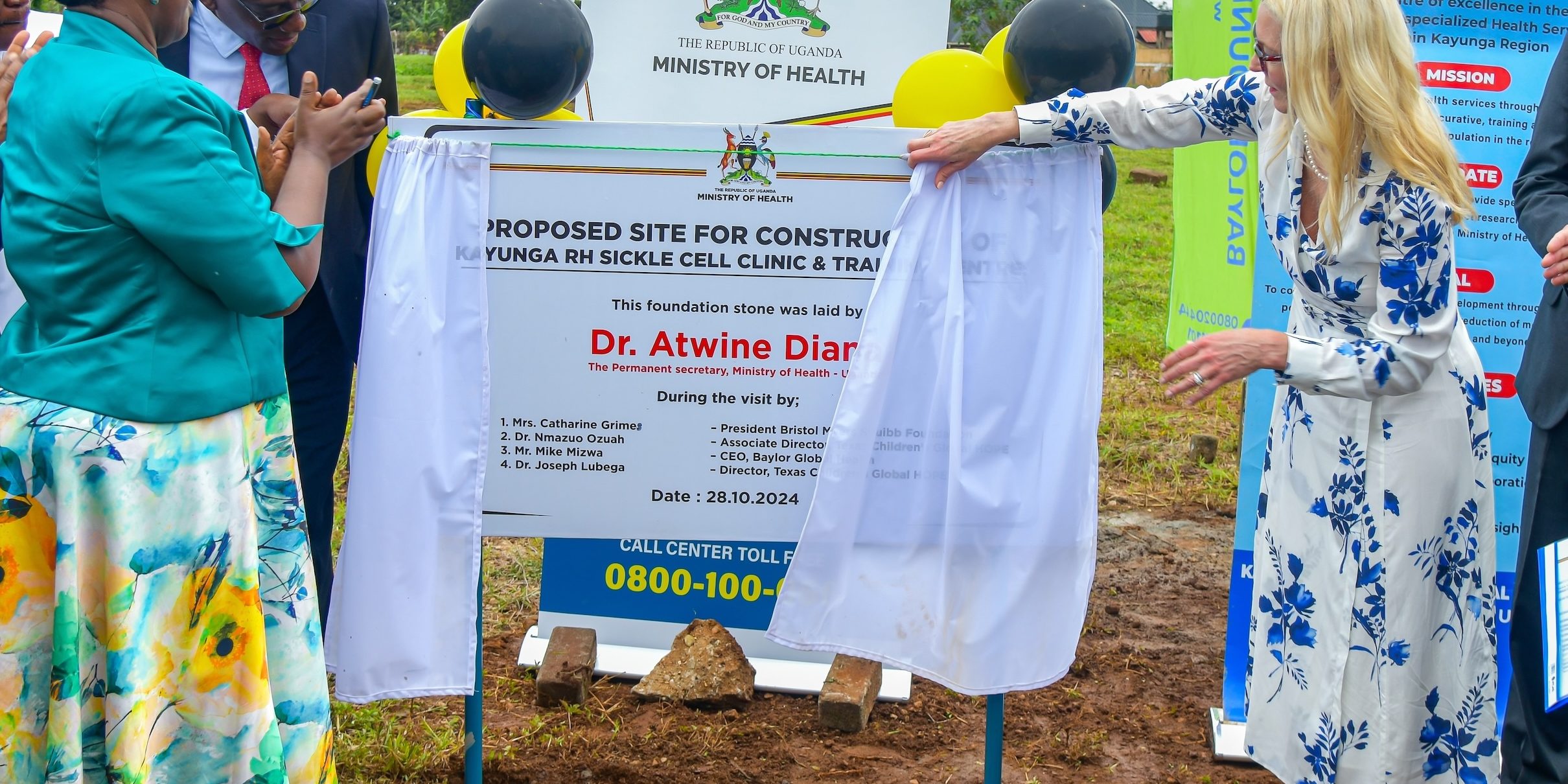On Monday, 28th October 2024, the Ministry of Health through its Non-Communicable Disease (NCD) Unit rolled out the “Integrating and Scaling up Sickle Cell Disease Care in Primary Health Services” program in Kayunga district.
This is in conjunction with Texas Children’s Global HOPE program and Baylor College of Medicine Children’s Foundation-Uganda, Uganda National Health Laboratory and Diagnostic Services (UNHLDS), Makerere University, Uganda Pediatric Association, and Mulago National Referral Hospital.
The Bristol Myers Squibb Foundation (BMS Foundation), an independent charitable organization, is providing funding to kickstart this program that will build on the extensive existing primary health systems in Uganda to integrate and scale up access to essential sickle cell disease care in Uganda.
This initiative aims at ensuring every infant in Uganda is screened for sickle cell disease, and those that have the disease, receive essential lifesaving care, namely: timely childhood vaccinations, penicillin to prevent fatal infections, and hydroxyurea – a drug that reduces sickling of blood cells to prevent complications of the disease.
Sickle cell disease (SCD) is a lifelong, inherited disorder affecting red blood cells and is a leading
cause of childhood illness and death in Uganda. Characterized by lifelong anemia, bone crushing pain episodes that last for days or weeks, disability from brain strokes in childhood, and early childhood death from infections, SCD brings severe health challenges in Uganda and many African countries. In 2023, an estimated 7.7 million people were living with SCD, with over 80% residing in sub Saharan Africa.
In Uganda, approximately 20,000 children are born with SCD each year, according to a 2016 study
published in The Lancet Global Health. While survival rates in high-income countries allow 90% of
children with SCD to reach late adulthood with optimal quality of life, nearly half of children born with SCD in Africa die before their fifth birthday. In Uganda, SCD complications are now among the leading reasons for hospital admissions for children.
“The enormity of the scourge of sickle cell disease in Uganda, and across Africa, requires public health approaches grounded in primary health systems. We don’t have to build those systems from the ground up. Instead, this program is integrating SCD care in existing child healthcare systems to be cost effective, sustainable, and reach affected children in their communities,” said Dr. Henry Mwebesa, the Director of Health Services at the Ministry of Health.
Many pilot programs have been conducted in Uganda by a variety of stakeholders; they have
demonstrated that basic interventions used to control SCD in Western countries are equally effective in African settings.
However, like Uganda, many African countries have spotty services that are based at referral hospitals and only reach a small minority of children with SCD. This new program leverages the
experience and systems of successful HIV care delivery in primary health settings across Africa to
deliver a package of high impact, evidence-based SCD care and reach the bulk of affected children.
“Our shared vision is to end the unconscionable suffering and childhood deaths for children with sickle cell disease. We, as Uganda, are proud to be ground zero for rolling out a new day for these children, for the future of Africa,” said Dr. Diana Atwine, the Permanent Secretary of the Uganda Ministry of Health.
This effort aligns with the Ministry of Health’s 2020/21 – 2024/25 Strategic Plan to reduce the burden of SCD in Uganda and reflects the commitment of partners to support Uganda in achieving this vital goal.
Dr. Joseph Lubega, the Director of Texas Children’s Global HOPE program, which has trained many of the first African pediatric SCD specialists and are spearheading this public health scale up across the region, reaffirmed the commitment of Texas Children’s Hospital and Baylor College of Medicine tosupport the initiative.
“This is the beginning of bringing an end to over 8,000 years of intolerable pain, disability, and tragic deaths because of SCD across Africa. These children and families cannot wait any longer.”
He emphasized that the program’s success will rely on partnerships with communities, advocacy organizations, health workers at healthcare facilities, non-government implementation partners, and leadership at the national level.
Dr. Lubega, an associate professor of pediatrics at Baylor College of Medicine, also thanked the Bristol Myers Squibb Foundation (BMS Foundation) for continuing to provide essential support to address the major health challenges affecting children in Africa and other underserved communities across the world.
According to Dr. Dithan Kiragga, the Executive Director of Baylor College of Medicine Children’s
Foundation-Uganda, “this partnership brings together key players who contribute extensive technical
expertise to ensure the project's success by improving service delivery for sickle cell disease across all levels of the healthcare system—from the community level to health facilities and up to the national level.”
“Families in Uganda know the devastating impact of sickle cell disease all too well. For Ugandans living outside of major urban centers, finding care is a significant challenge and sometimes not even possible,” said Catharine Grimes, President of the BMS Foundation.
“Our new initiative, in partnership with the Ugandan Ministry of Health, will integrate lifesaving early-stage interventions into primary care facilities in non-urban areas by leveraging the infrastructure and local health care capacity we have already built to address previous urgent crises like HIV/AIDS.We are focused on empowering Ugandan health workers to provide sustainable, long-term care,” said Grimes.
The Bristol Myers Squibb Foundation will work in partnership with local health care professionals to turn the tide against sickle cell disease to deliver a brighter, healthier future for families across the country.

